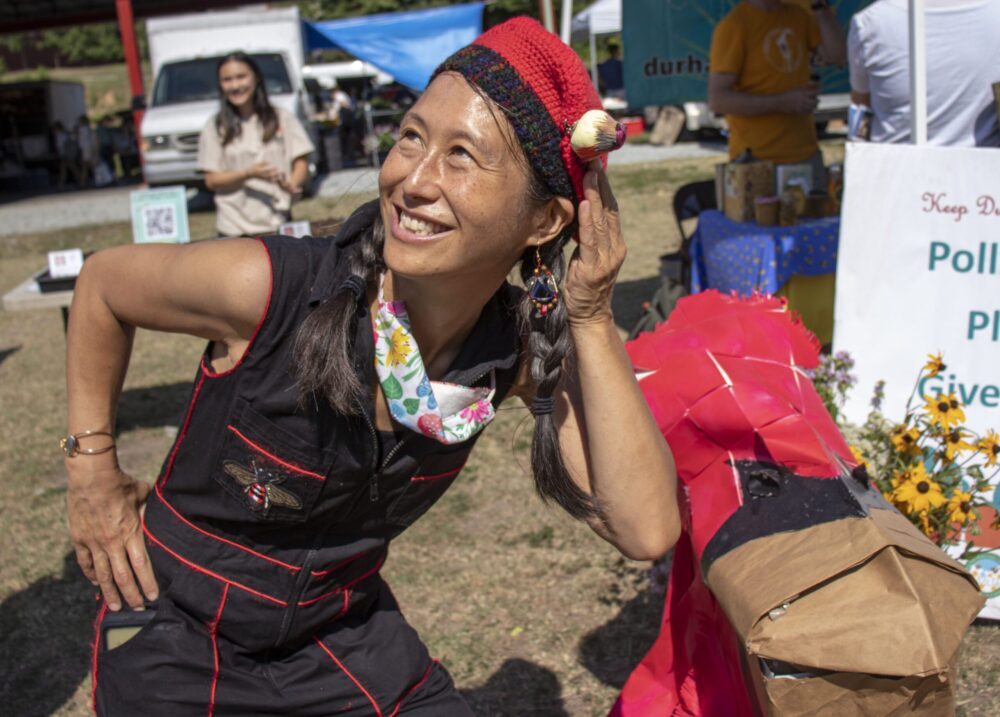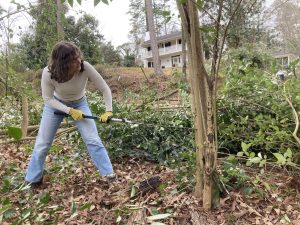A cluster of bee-curious adults and children lick luscious drops of golden honey off their knuckles. At a craft table nearby, crowds of young kids—dressed in yellow and black outfits—and their parents make custom bee-antenna headbands. Some of the young families join a musician in a bee-themed outfit as she plays lighthearted acoustic music.
It’s June 25, the first annual Bee Day at the Durham Farmers’ Market, where scores of people gather on a sunny, sultry morning to celebrate, and learn about, one of nature’s bee-siest and most valuable creatures.
Hosted by Keep Durham Beautiful and the Durham County Beekeepers, the event was designed to raise awareness and ignite interest in the fight to save the pollinators as their population rates decline around the world.“Bees, among other native pollinators….are really important to not only our food systems, but the food systems of the entire ecosystem,” says Dawn Keyser, one of the event’s hosts and the program coordinator for Keep Durham Beautiful. “The lack of habitat and increased pesticide use by people is really impacting their populations in a negative way. So it’s important for people to know that their actions cause reactions in our ecosystem. And this is just a really great way to let everybody know about that.”
Sporting a honeybee antenna headband and a tiny yellow backpack, one father holds his two young children’s hands as they move from a craft table to the Durham County Beekeepers’ tent. 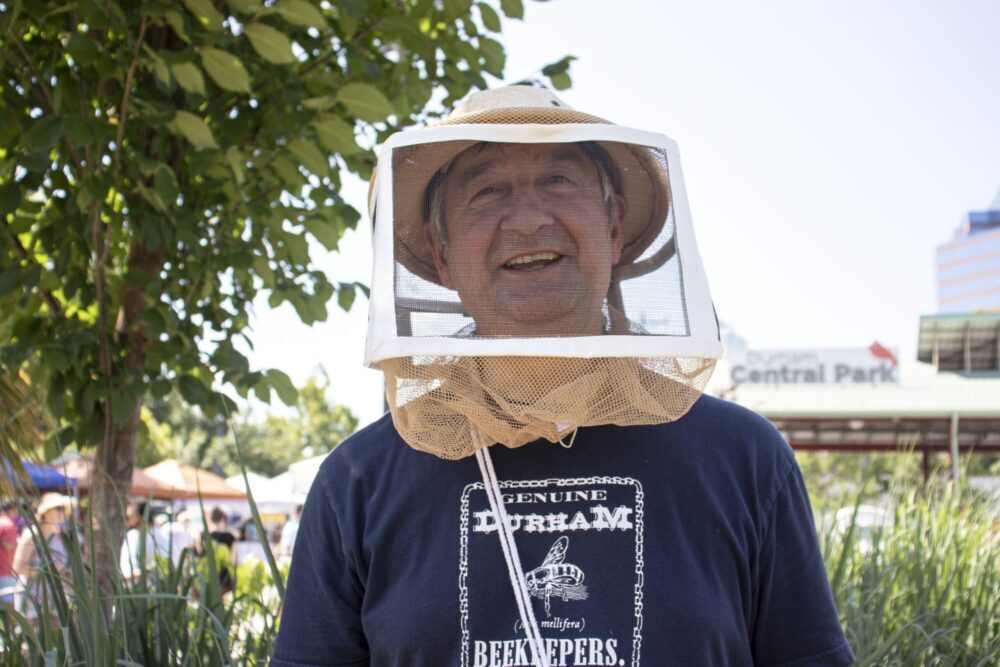
Then he offers the children some honey. Each is a different consistency and color. A lighter, more transparent honey is harvested in the spring. The heavier, darker honey is sweeter and yielded during summer, he explains.
The Durham City Council proclaimed the town a Bee City in June 2016. Since then, groups such as Durham County Beekeepers have informed neighbors and community members about efforts to keep these creatures alive. (You can, for example, start your own hive.) Keep Durham Beautiful, a nonprofit that leads environmental initiatives in the city, also teaches people about what foods require pollination.At the event, they have a tent where people can pot plants for pollination.
Today, 2.92 million bee colonies exist in the U.S. Though only 22,000 of them are in North Carolina, bee colonies comprise a vital part of our ecosystem. As the creatures pollinate over 80% of plants globally, a world without bees doesn’t seem possible. But as climate change worsens and creatures like mites destroy hives, the bees face an accelerated decline.
National Pollinator Week is celebrated every year from June 20-26. It’s been around since 2008, and events such as the Durham Bee Day are among hundreds nationwide that draw attention to theissues bees battle.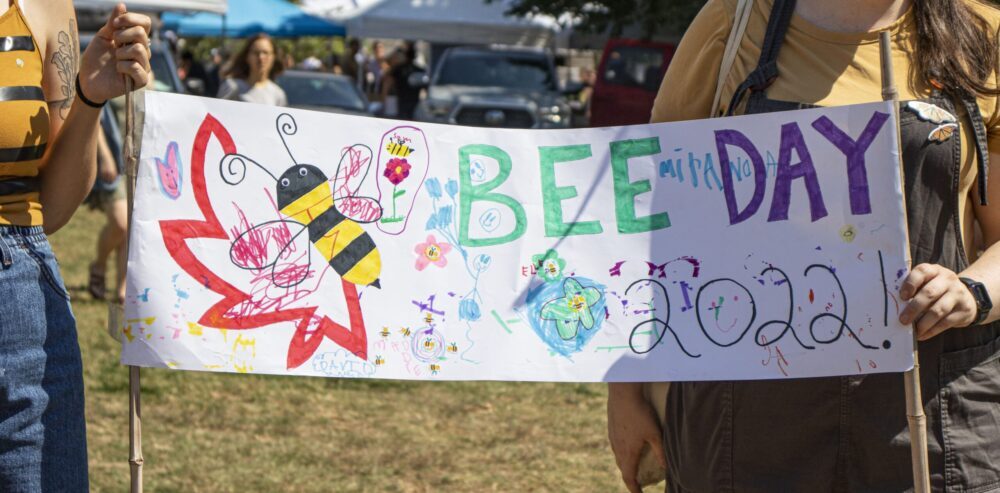
Yeung, who appears to be in her late 20s or early 30s, says she joined the beekeepers’ association just last year. But she has been beekeeping since the pandemic began after inheriting a hive from a neighbor who moved away. When it didn’t survive, she wanted to try again. This time, she decided to seek guidance from a local apiary.
“The owner [of the apiary] would come out and teach me how to start handling the bees with the smoker [an instrument that releases smoke to calm the bees],” she says. “Just get comfortable being slow and moving calmly, and looking at the changes throughout the seasons.”
As time went by, she began to see her hives replenish themselves. Now she gets excited whenever she watches a new queen bee join.
Yeung says she still has much to learn. When she took out a frame—the structure holding the honeycomb—last month to check on her bees, she only yielded a pound of honey. However, a few days ago, she almost brought in five frames of honey. Yeung could only take out four, though.
“I was about to take out the fifth frame, and they were like [the bees], ‘No, leave this for us!’” she recalls. “And they stung me. I got stung in my scalp, my lip… Yeah, it’s kind of a process to just do it.”
At 10:30 a.m., Ward 1 Council Member DeDreana Freeman swaps places with the bee-clad musician and reads the Bee City proclamation. The craft table hosts and the children playing there finish signing their names on a colorful Bee Day 2022 sign.
As Freeman finishes the proclamation, the children take the sign and start a line. Parents march next to them. Beekeepers and community members also join the parade. A dog named Otis wears a bee costume.
Yeung runs to the front, where she bangs on a tambourine with an Earth flag. The children buzz kazoos. As the group walks through Central Park, they chatter and get onlookers to join. One woman chuckles and says, “We’re no longer the Bull City. We’re the Bee City.”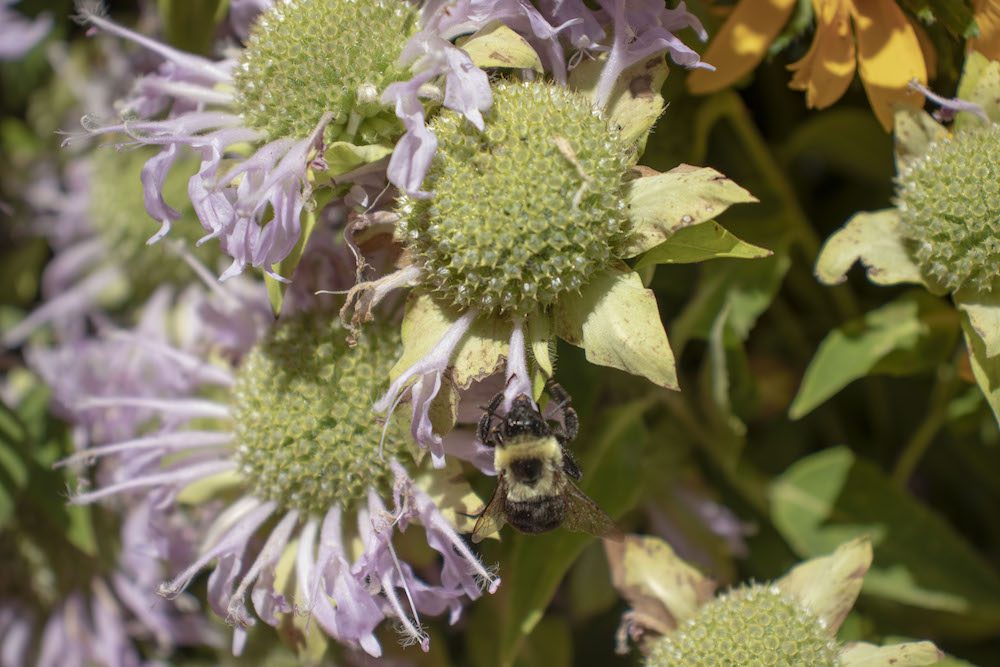
Ana Young

